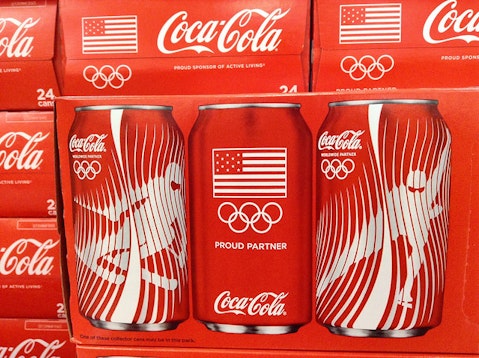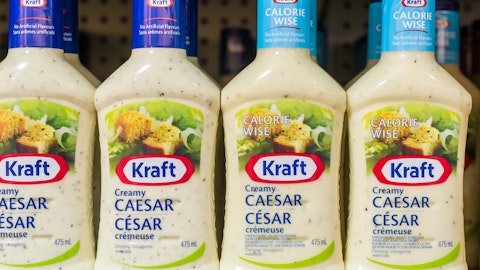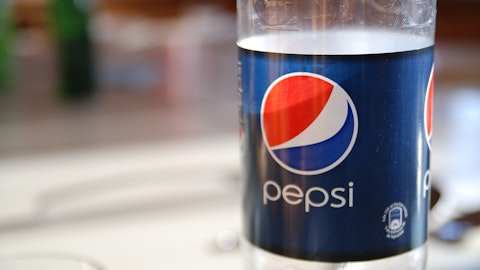Both Pepsico Inc. (NYSE:PEP) and the Coca-Cola Company (NYSE:KO) have been strong leaders in the highly profitable soft drink/beverage industry for decades. Coca-Cola owns the most well-known brand worldwide, while Pepsico, which also by the way enjoys great brand recognition, is more diversified than its rival. When most people think about rivalries in general or in the beverage industry in particular, they think of the “cola wars” straight away, the endless clash for market leadership between Coca-Cola and PepsiCo. But that’s not the whole story. Therefore, in the following article we will provide a multi-faceted analysis of the two companies in an attempt to suggest the better and more attractive company for investment.

focal point / Shutterstock.com
Why do we pay attention to hedge fund sentiment? Most investors ignore hedge funds’ moves because as a group their average net returns trailed the market since 2008 by a large margin. Unfortunately, most investors don’t realize that hedge funds are hedged and they also charge an arm and a leg, so they are likely to underperform the market in a bull market. We ignore their short positions and by imitating hedge funds’ stock picks independently, we don’t have to pay them a dime. Our research have shown that hedge funds’ long stock picks generate strong risk adjusted returns. For instance the 15 most popular small-cap stocks outperformed the S&P 500 Index by an average of 95 basis points per month in our back-tests spanning the 1999-2012 period. We have been tracking the performance of these stocks in real-time since the end of August 2012. After all, things change and we need to verify that back-test results aren’t just a statistical fluke. We weren’t proven wrong. These 15 stocks managed to return more than 145% over the last 34 months and outperformed the S&P 500 Index by 85 percentage points (see the details here).
A recent report issued by Beverage Digest reveals that the carbonated soft drink case volumes in the U.S. have declined for ten straight years, reaching a level of 8.8 billion 192-ounce cases in 2014. By the same token, the U.S. per capita consumption of soda drinks has plummeted to its lowest level since 1986, reaching a figure of 673 eight-ounce servings per year. Consequently, the non-alcoholic beverage companies, including the two companies under discussion, have been adversely affected by this sluggish demand for soda drinks. As a result, both Coca-Cola and PepsiCo have been expanding into alternative beverage categories that are considered healthier. Let’s start off by comparing the performance of the two stocks and we’ll then take a closer look at their recent financial performance and on the hedge fund sentiment on these stocks.
The shares of PepsiCo have increased by only 0.26% since the beginning of the current year, while the shares of Coca-Cola have dropped by slightly more than 5% year-to-date. In the meantime, Coca-Cola has a higher dividend yield than its rival, generating a dividend yield of 3.3% compared to the 2.9% dividend yield of PepsiCo. Specifically, Coca-Cola pays out an annualized dividend of $1.32, while PepsiCo pays out a higher annualized dividend of $2.81. Moving on to the companies’ financial performance during the first quarter of the current year, we can state that both Coca-Cola and PepsiCo delivered financial results that were at least in line with the analysts’ expectations. Coca-Cola reported adjusted earnings per share of $0.48, which yields an increase of 9.1% year-over-year. Meanwhile, PepsiCo posted adjusted earnings per share of $0.83 that marks a lower year-over-year increase of 2.5% than its rival. Moreover, Coca-Cola reported a revenue growth of 1.3% year-over-year, reaching a figure of $10.7 billion. However, PepsiCo’s first quarter revenue of $12.2 billion dropped 3.2% year-over-year. Therefore, it seems that the company between the two which is trending in the right direction is when it comes to recent financial performance is Coca-Cola. As of June 26, Coca-Cola was trading at a forward price-to-earnings ratio of 18.78, while its major rival, PepsiCo, had a slightly higher forward P/E ratio of 19.37. However, Coca-Cola’s trailing P/E is equal to 25.16, higher than PepsiCo’s figure, which that stands at 22.10.
Insider activity at Coca-Cola has been insipid since the beginning of the current year, with the exception of two relatively major sell-offs by the President of The Coca-Cola Company’s Europe Group, James Quincey. The first sell-off contained 171,800 shares, while the other one involved a number of 114,784 shares. James Quincey exercised options and sold all of these shares for roughly $12.11 million, remaining with 24,695 shares. In the meantime, insider trading at PepsiCo hasn’t been too interesting either, as there were no insider purchases in 2015. By the same token, even though the insider sales have seen more activity, the sell-offs were not significant at all. However, one of the noteworthy sell-offs involved Indra Nooyi, the Chairman and CEO at PepsiCo, who sold 58,054 shares in 2015 andwas left with a remaining stake of 736,349 shares.

In addition to insider buying and selling, we will also take a look at the hedge fund activity in the shares of these two companies. Coca-Cola is owned by 65 hedge funds compared to 58 which reported ownership positions during the previous quarter. However, the value of the overall holdings decreased to $21.71 billion from $22.45 billion, though this was because of the decrease in share price during the quarter; aggregate shares held actually increased slightly. Within our database, Warren Buffett’s Berkshire Hathaway is indisputably the largest shareholder in Coca-Cola by owning 400 million shares, which represent 15.13% of its entire public equity portfolio. Furthermore, Donald Yacktman’s Yacktman Asset Management, which is the second-largest shareholder in Coca-Cola within our database, has slightly reduced its stake in the company to 38.93 million shares. In the meantime, the number of hedge funds that hold equity stakes in PepsiCo increased to 61 from 54, while the total value of the investments increased to $8.02 billion from $7.17 billion. Interestingly enough, Donald Yacktman represents the largest investor in Pepsico Inc. (NYSE:PEP) with 25.49 million shares, which might indicate that he is not focused on choosing a better performer between the two but is rather is betting on higher performance of the beverage industry in general. Within our database, Nelson Peltz’s Trian Partners is the second-largest shareholder in PepsiCo with 18.32 million shares.
Follow Warren Buffett's Berkshire Hathaway
To conclude with, it’s up to you which stock to choose between the two beverage titans, but we do believe that both companies tend to be influenced by the same external factors and perform similarly despite having some differences in their market focus.
Winner: Draw
Disclosure: None





